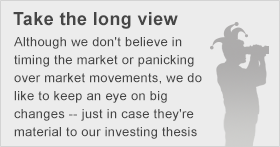
U.S. stocks are flat on Thursday morning, with the benchmark S&P 500 and the narrower Dow Jones Industrial Average (^DJI +0.48%) down 0.13% and 0.10%, respectively, at 10:15 a.m. EDT. The Dow achieved an all-time high yesterday and the S&P 500 closed within a half percent of its early April record high. Those milestones appear consistent with the Federal Reserve's decision to press on with the rollback of its securities buying program, yesterday announcing another downward increment of $10 billion per month, despite the fresh, underwhelming first-quarter GDP growth reading of just 0.1%. The divergence between the GDP print and the Fed's show of confidence puts an even greater than usual spotlight on tomorrow's April unemployment report.
The Fed isn't the only actor that is upbeat, as animal spirits appear to be on the comeback in corporate boardrooms: On Monday, I highlighted the fact that the value of global mergers and acquisitions year to date has reached its highest level since 2007. This morning alone, Bloomberg reported that Sprint is planning to move ahead with an offer for T-Mobile, while The Wall Street Journal reported that another telecom carrier, AT&T, approached satellite TV operator DIRECTV concerning a possible acquisition.
Are these cases of heightened animal spirits or simply the manifestation of a sector that is undergoing an important secular transformation? Yes to both, in my opinion. Keep in mind these reports come on the back of two possible megadeals in the pharmaceuticals industry.

Of course, animal spirits can go awry when they overwhelm corporate chieftains' best judgment. One recent example of this is Coca-Cola's (KO 0.22%) new compensation plan, which Berkshire Hathaway CEO Warren Buffett called "excessive" (Berkshire is Coca Cola's largest shareholder).
I've been strongly critical of Buffett's decision to abstain from voting on the new plan, which could issue 340 million Coca-Cola shares and options over four years, despite his avowed opposition. Buffett's defense is that he has made his views clear to Coke's CEO on several occasions and that he did not want to shame him or his board publicly. Finally, as he told The Wall Street Journal, abstaining was "just as clear as voting no, in my view."
I did not buy into this logic on principle, but it appears that the practical result of abstaining may be the same -- or superior, from Buffett's point of view -- as a "no" vote. Indeed, the Journal reported today that Coca-Cola "likely will revise its executive-compensation plan before it goes into effect next year, bowing to pressure from billionaire investor Warren Buffett."
The official line from Coca-Cola is that it's business as usual; in a statement, the company said:
No changes are being made to the plan at this time. The plan already offers maximum flexibility, including the ability to extend the life of the equity plan, to ensure that it continues to meet the needs of the business and remains in line with all shareowner interests.
However, the second sentence suggests the company could avail itself of the plan's "flexibility" to curb its dilutive impact on shareholders.
Certainly, despite his abstention, Buffett did not conceal his opposition to the plan, a position that has garnered widespread attention in the media. Activist investors may be on the rise, but perhaps there is still a place for Warren Buffett's velvet-handed corporate diplomacy. Still, shareholders will have to wait for the "taste test" -- it'll be interesting to see what flavor Coca-Cola ultimately gives the new compensation plan.
